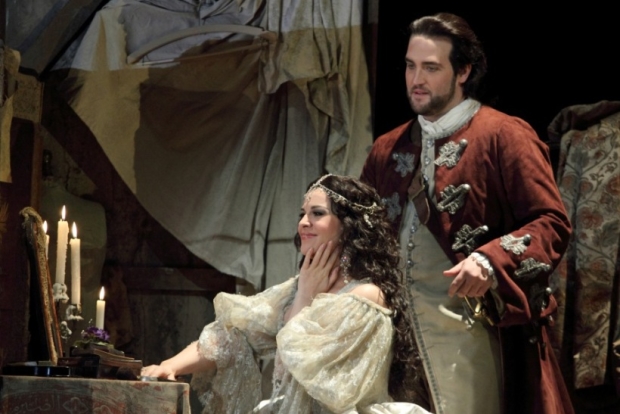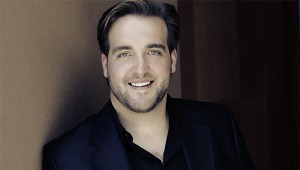Review: Adriana Lecouvreur (Royal Opera House)
Angela Gheorghiu marks her 25th season at Covent Garden with a return to Cilea’s tragedy

© Catherine Ashmore
It doesn't come around often so grab it while you can. The Royal Opera's revival of Adriana Lecouvreur, the first since David McVicar's original-period staging opened in 2010, is a rare delight. It's a triumph of orchestration more than anything else, with hearty chunks of melody piled into a generous harmonic stew. Imagine an Italian opera composed by Tchaikovsky and you're halfway there.
The plot is standard verismo perfumed with a sprinkling of historical glamour. In 18th-century Paris, celebrated actress Adriana has fallen in love with Maurizio, the dashing Count of Saxony. Alas for her, his former mistress, the Princess of Bouillon, is not prepared to relinquish her lover lightly—and hell hath no fury like an entitled aristocrat scorned. Cue some dodgy violets, then it's sniff-'n'-snuff for poor Adriana.
Few directors know better than McVicar how to fill a stage, and his ingenious use of physical elements to draw the eye where it needs to go, even during the busiest of ensembles, is a tribute both to him and to his design team of Charles Edwards (sets) and Adam Silverman (lighting). Covent Garden's hapless Trovatore creatives should be taking notes.
At the heart of his concept, as with his earlier Rigoletto for the ROH, is a lowering three-dimensional set that revolves to suggest a range of locations as the opera unfolds. This one is fundamentally a scale model of the Comédie française. "It should feel like Adriana's toy theatre", explains Edwards in a programme interview. "A way of escaping into a dream world".
For much of the opera's duration this stage-within-a-stage is an empty shell, viewed from a variety of angles. At one point though, when it is dressed and facing us, a tiresome cod ballet is played out to camp choreography by Andrew George. It's the one false step in an otherwise sure-footed production.
'Sensual harmonies that melt into resolution'
Opening night's most unexpected pleasure was the sympathetic conducting of Daniel Oren, a maestro with a mixed track record at the Royal Opera but who seems thoroughly at home in Cilea's sumptuous idiom. It's unsubtle music, but like a well-written musical it twangs the emotions and Oren did well to highlight its charms: undulating orchestral motifs, a melodic sheen scratched by itchy accidentals and key shifts, sensual harmonies that melt into resolution.
This revival marks Angela Gheorghiu's 25th anniversary at the Royal Opera House, and it finds the soprano in striking form as an actress, slightly more fragile as a singer. Although touching and affecting in Cilea's high writing, Gheorghiu's low register was a little weak and for power she was outshone by the stunning Ksenia Dudnikova as her nemesis. New to me, the young Uzbeki-Russian mezzo is a talent to be reckoned with. Remember the name. Well, try to.
When I interviewed Brian Jagde a year or two back he described himself modestly as "fresh off the boat". On this showing we should be offering him UK nationality. The young American's voice has grown in power and tonal beauty even in the short time that's elapsed since he sang Pinkerton here. Already a prodigious instrument, it has the potential for him to become one of the great modern tenors.
There's scarcely room to acknowledge the lustrous baritonal presence and subtle acting of Gerald Finley as Michonnet, the ageing stage manager who is privately besotted with Adriana, and none at all to celebrate the uniformly strong supporting cast for its panoply of colourful contributions.
Of all McVicar's incidental felicities the final flourish is perhaps the best, as Adriana's very moment of death is played out before onlookers and becomes her final performance. For her, although happily not for the great Gheorghiu, "la commedia è finita".
Adriana Lecouvreur runs in repertory at the Royal Opera House until 2 March.













